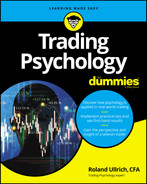Chapter 17
Ten Success Secrets of Mentally Superior Traders
IN THIS CHAPTER
![]() Improving your plan and process orientation
Improving your plan and process orientation
![]() Managing your money and your opportunities
Managing your money and your opportunities
![]() Developing your mental edge in trading
Developing your mental edge in trading
In this chapter, I show you the top ten secrets of success that characterize the work of mentally superior traders. If you follow the approaches listed here, practically nothing can stand in the way of your becoming a successful trader.
Gaining the Right Inner Attitude to Trading
If you’re a successful trader, you've come to understand that trading is
- A business that works according to certain rules defined by the market
- An ongoing personal learning and development process
- An area where you have to maintain an emotional distance from your trading positions and focus instead on your strategy and setups and on signals from the markets
Adopting a Process-Oriented Trading Approach
Success means that you understand the importance of processes and that you have
- Set up your trading processes and systematized your trading
- Acted solely according to your tested and proven strategies
- Applied a fixed set of rules with setups that you've tested in a simulated environment so that these rules determine entries and exits, position sizes, and holding periods
- Ensured that your systems and processes are flexible as you continuously develop these elements and adapt them to market requirements
Prioritizing the Protection of the Capital in Your Trading Account
If you don't preserve capital and prevent loss in your portfolio, you can’t be successful, so you need to
- Develop a money- and risk-management system to protect your portfolio
- Avoid concentration risk and establish an upper limit for the maximum size of single positions
- Determine a risk measure for the maximum loss amount you can tolerate per day or week
- Limit losing streaks (though you cannot prevent them) in accordance with your portfolio risk
- Stop trading immediately when you reach your defined loss threshold
- Adapt your strategy and setups where necessary (only after you've completed an error analysis) and regain a balanced emotional state as you start trading again
Carrying Out the Necessary Mental Loss Management
Successful traders know that it's all in your head, so you
- Recognize that losses have nothing to do with you or your ability but are instead part of the trading business — a business you’re actively managing according to risk levels
- Truly accept losses and see them as a learning opportunity — rather than taking them personally and identifying with them. (You are not your trades.)
- See individual losses only in the context of your entire portfolio and the profitability of the day or week
- Refuse to hold on to losing trades, because you are unafraid of having to realize small losses
Exercising Mental Opportunity Management
Successful traders build their success on recognizing opportunities such as these:
- Focusing on the profits and goals you want to achieve
- Defining a profit target for each trade
- Following market price action and avoid trading against trends
- Choosing big-profit opportunities and, wherever possible, applying the pyramid strategy, as described in Chapter 11
Staying Humble
If you’re a successful trader, you know that humility is a virtue and that you
Internalize the imperative that you will never listen to your ego when it comes to the stock exchange
Humility in place of dogmatism is the only attitude that promises success
- Accept the fact that markets are not fair, are not equitable, and never care about your feelings
Taking Responsibility
If you’re a successful trader, you talk the talk and walk the walk, which means that you
- Internalize the concept that you alone are responsible for your success or failure
- Always refrain from blaming the markets, the broker, the trading platform or software, or any other adverse circumstances for your mistakes
- Concentrate on improving your systems and setups
- Ensure that you have the mental strength and emotional stability necessary for successful trading
Keeping a Trading Journal
Successful traders write it all down. Follow these suggestions:
- Use your trading journal to analyze mistakes, carry out some self-reflection, and chart your personal and professional development.
- Analyze your entries in the journal to identify subconscious patterns of thought and behavior that may be blocking your success.
- Recognize the trading journal as an excellent coaching tool.
Finding Your Personal Trading Style
Successful traders know that no two successful traders are alike. To enhance your uniqueness, you
- Successfully assess your own character traits and skills
- Use simulated environments to determine the right trading style for you
- Trade using only those market niches, financial instruments, and time frames where your strengths come to the fore and you have a distinct trading edge
Maintaining the Balance between Cognition and Emotion
When you’re a successful trader, you know that balance is the key to maintaining your mental edge in trading:
- You trade only in a state of psychological and physical stability.
- You realize that you’re fully cognitively capable only when you’re in an emotionally balanced state.
- You use relaxation exercises and mental techniques to restore the balance between cognition and emotion.
